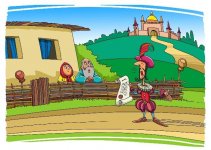December 13th THE PARABLES
December 13th THE PARABLES
The Grand Evening Meal (Luke 14:16-24)
The Grand Evening Meal (Luke 14:16-24)
When the dinner hour came, he sent around his slave, to say to those who were invited, 'Come! for it is now ready!'
Luke 14:17, Goodspeed New Testament
Luke 14:17, Goodspeed New Testament
Context: This parable was related to a guest at a meal who said: “Happy is he who eats bread in the kingdom of God.” It was customary to notify those previously invited to a feast when the meal was actually ready. Some revealed gross disrespect for the host by begging off from this grand event, preferring to prioritise their work, possessions or family. Those invited later, namely the poor, the crippled, the lame, the blind, were persons viewed as unworthy.

Meaning: When the Jews rejected the Son of God, the invitation was sent out to the gentiles, many of whom realised their need for salvation and responded without any postponement. The parallel account in Matthew 22, informs us that the invitation went out to “both evil and good” (vs 10) – we notice that Grace is not contingent upon morality.
Application: The God of “highways and hedges” is completely other-centred. He says, “Come!” to all, which indicates the simplicity of salvation. The work of salvation through Christ is finished, “now is the day of salvation” (2 Cor 6:2). The Christian life is depicted here as a joy-filled feast although many give the impression that it is a fast, a funeral, or a famine. All the joy of life can be squeezed out by religious rules and routines. Salvation, like food at a meal, must be received within. Jesus Christ is the Bread of Life. It is no surprise that many are preoccupied with self: job, possessions, and family. They choose legitimate second-best interests over the best – the King and His Kingdom.
_____________________________
Two words stand out in verse 17 – “come” and “now.”
Two words stand out in verse 17 – “come” and “now.”
